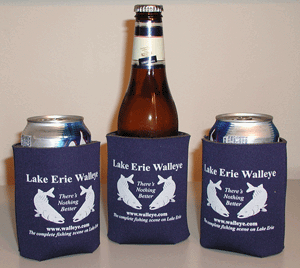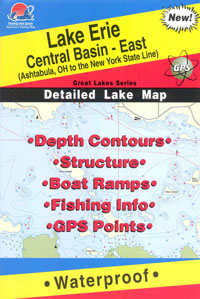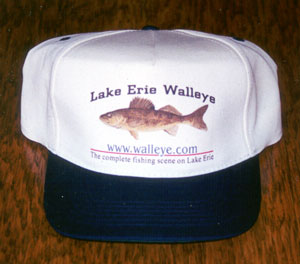|
Late Fall Walleye Round-up
By Gary Parsons and Keith Kavajecz
Do you feel it?
It’s that chill in the air combined with the anxiety
 churning in your
belly … the signals that late fall is here and the hunt for big walleyes
is on! Sure, we know you’ve got a “pre-winter” to-do list a mile long …
who doesn’t. But you can’t let this opportunity pass by. The best
big-fish bite of the season is happening now and you’d better make hay
or before you know it, you’ll need an ice auger to wet a line. churning in your
belly … the signals that late fall is here and the hunt for big walleyes
is on! Sure, we know you’ve got a “pre-winter” to-do list a mile long …
who doesn’t. But you can’t let this opportunity pass by. The best
big-fish bite of the season is happening now and you’d better make hay
or before you know it, you’ll need an ice auger to wet a line.
It’s almost cliché
… but it’s true, late fall is trophy walleye time. It seems that no
matter what the body of water, if it holds walleyes, this is the time of
year that offers one of your best chances of catching the biggest
specimens in the system. But when it comes to true trophy
opportunities, few venues offer the potential like the waters of The
Great Lakes.
History has proven
that there are a handful of key areas around the big ponds that offer
some real monster walleyes in late fall. Places like Lake Erie near
Huron, Ohio, or the upper reaches of Lake Michigan, specifically Little
and Big Bay De Noc, and the waters off Sturgeon Bay, are all well known
fall walleye meccas. Other all star nominees would include the waters of
Bay of
Quinte off Lake
Ontario and Saginaw Bay of Lake
Huron.
All these waters
have in common their vast expanses of fishing areas and huge walleyes.
They are also areas where walleyes congregate in the fall to put on the
feed bag prior to winter’s onset. It’s a seasonal migration that plays
out every year; walleyes moving from the open water basins where they’ve
spent the summer to more “near-shore” breaks and structures. The reason
is food. Walleyes are in pursuit of large schools of baitfish that will
sustain them for the upcoming winter months. It’s like an old west
cattle drive … the walleyes corralling baitfish, and anglers rustling up
walleyes. Time
to gitty-up and head for the fall walleye round-up.
Tackle and
techniques for the walleye round-up is not much different from the
tactics used in summer. Trolling is still the name of the game, just the
locations change. While it wasn’t unusual to target walleyes suspended
over fifty feet of water or more a few months ago, now the fish are apt
to be more bottom oriented with popular depths from as shallow as 6 feet
(at night) to 50 feet during the day. That’s not to say there won’t be
some fish suspended, but check your graph and we’ll bet that most of the
time your odds tend to be better fishing lures near the bottom. You’re
looking for fish relating to structure, be that main lake flats, reef
systems, or primary shoreline breaks with access to deep water. During
the peak of summer, you may have had to run 20 miles or more to locate
schools of walleyes in the basin. Now you may only need to travel two or
three miles at most from the launch to contact fish (great news for
those looking for walleyes that won’t cost them dearly at the gas
pumps!).
Tackle choices in
this situation lean toward the hard side. Crankbaits rule. What may
surprise you however is the style of crank that becomes the top producer
this time of year. Conventional thinking would have you looking at the
cooling water temperatures and consider lures with a subtle rolling
action. But remember what’s first and foremost on the minds of the
walleyes this time of year … food. That tends to put these fish in an
aggressive mood. Lures that match their aggressive attitude and the size
of the forage in late fall will get more attention. Large, high-action
baits like the Deep Diving Reef Runner 800 Series, Smithwick Spoonbill
Super Rogue, Bomber model 25A Long A and the Dave’s Lures Deep Ka-Boom
Shiner are all great lures that not only get the fish’s attention, but
easily dive to the depths where most of the walleyes are being
targeted.
Although this is
Great Lakes walleye trolling, you
need to change your mind-set a bit from the tactics used for covering
the openness of the main lake basin in summer. Trolling boards like Off
Shore Tackle’s OR-12 Side Planers are still useful if you find the fish
in open water flats, but if you’re targeting walleyes relating more to
structure (reefs or shoreline), you don’t want to be letting those
boards way out away from the boat. Keep your spreads tighter, or maybe
only run one board line out over the open water away from the break to
see if there are a few suspended stragglers lurking out there.
One word of caution
regarding fishing these big bodies of water this late in the season,
bundle up and lean toward the side of safety. The winds of November can
blow cold and blustery on The Great Lakes. If you’re going to fish
effectively you’ve got to hit the water prepared. Insulated clothing,
plenty of layers and quality rain gear like the Bass Pro Shops 100 MPH
rain suit are a must. It’s a “dressed for success” combination that will
keep out the cold, wind and wetness that could quickly put a real damper
on an otherwise great day on the water.
Now’s the time all
you walleye buckaroos … fall ain’t just for football, raking leaves and
deer hunting. This is walleye round-up time. The Great Lakes can offer
some dynamite angling opportunities anytime of the season, but fall
means trophy time, and after all, much of what’s on that pre-winter
to-do list could really wait until spring anyway … but by then the
spring bite will hot. Oh well … such is the life of a walleye angler.
Editors Note:
If you have
questions or comments on this or other articles from Gary Parsons and
Keith Kavajecz, visit
their website
www.thenextbite.com.
|





 churning in your
belly … the signals that late fall is here and the hunt for big walleyes
is on! Sure, we know you’ve got a “pre-winter” to-do list a mile long …
who doesn’t. But you can’t let this opportunity pass by. The best
big-fish bite of the season is happening now and you’d better make hay
or before you know it, you’ll need an ice auger to wet a line.
churning in your
belly … the signals that late fall is here and the hunt for big walleyes
is on! Sure, we know you’ve got a “pre-winter” to-do list a mile long …
who doesn’t. But you can’t let this opportunity pass by. The best
big-fish bite of the season is happening now and you’d better make hay
or before you know it, you’ll need an ice auger to wet a line.